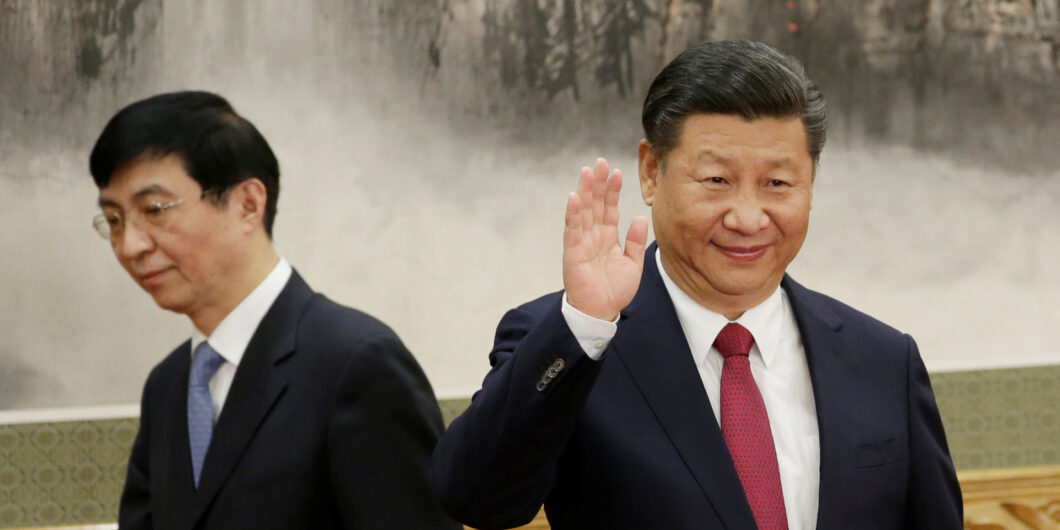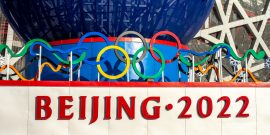How dare free American citizens say something in favor of political freedom.
The Emperor's Tutor
In 1988, Wang Huning was a popular and well-known political scientist and Professor of International Affairs at China’s Fudan University. That same year, the then 33-year-old Wang embarked on an odyssey, a trip that would take him to the United States as a visiting scholar and across the country to more than thirty cities and more than twenty colleges and universities. In the open spirit of exchange of the times, Wang’s trip was sponsored by the American Political Science Association.
In the decades that followed, Wang would rise to remarkable prominence as a close confidant to the succession of China’s paramount leaders—the “Emperor’s Tutor” to General Secretaries Jiang Zemin, Hu Jintao, and now to Xi Jinping. His ascent into the topmost ranks of the Chinese Communist Party (CCP) has been unprecedented; he is now the fourth-ranking member of the Politburo Standing Committee of the CCP. Wang is also widely regarded as the Grey Eminence of the Party, likely the principal architect of China’s political ideologies and both domestic and foreign policies.
Those ideologies and policies are influenced, in part, by Wang’s experiences in his travel across the United States. His account of that journey, America Against America, is an assessment of the “historical–social–cultural conditions” that created and still shape the American political landscape and its system of governance and economics. Wang’s observations and judgments have also influenced several generations of Chinese leaders and bureaucrats. More than thirty years after its first publication in 1991, the book is still widely read.
Travelogue and Propaganda
On one level, America Against America reads like a travel diary composed of recollections, first impressions, and a distracting series of disjointed anecdotes. Wang’s book suffers in comparison to the accounts written, for example, by Alexis de Tocqueville (Democracy in America 1835, 1840), Rudyard Kipling (American Notes, 1891), and G. K. Chesterton (What I Saw in America, 1922). Wang makes superficial assessments and snap judgments that echo long-standing critiques of the social ills of the United States including the plight of the homeless (described as “Beggar’s Kingdom”), the nation’s organized crime (compared to the criminal Chinese “Triads”), and the seeming epidemic waves of drug addiction. In many ways, this is a broader reflection of what Chinese scholars and politicians thought of the United States in the 1980s. That jaundiced view of the country is reinforced by Wang’s narrative and fails on two counts.
First, Wang overgeneralizes and largely fails to support his condemnatory assertions with facts. In assessing the problem of racism in America, for example, Wang writes “In the hearts of many white people, the psychology of hating black people is very strong,” without giving the reader anything more than anecdotal evidence that this is, indeed, the case. He also claims organized crime “dominate(s) a large portion of American society,” but fails to note just how large or which portions.
He also succumbs to the Nirvana Fallacy. In describing the social challenges the homeless present, he finds it “perplexing” that a nation “with a great abundance of goods” cannot redress the problem. He then indicts the “nature of the system,” that is, democratic capitalism, because “American culture and American spirit do not provide the conditions to solve this problem.” His point then is clear: capitalism is failing because it is not the perfect engine to solve all social ills.
America as Allegory
In the stultifying environment of Chinese political discourse in the late 1980s and early 1990s, there was no room for outright criticism of China’s domestic policies or political order, much less any hint of criticism of the CCP or its leaders. That discourse was marked by elusory references of the tragic cost of the Great Leap Forward and the Cultural Revolution that claimed the lives of tens of millions of Chinese and opened great rifts in Chinese society. The aftershocks of the 1989 fifty-day pro-democracy protests and the Tiananmen Square Massacre could still be felt, too. So, oftentimes, critics of Beijing’s policies, or advocates of changes to policy made subtle, even allegorical arguments in their writing.
It is highly likely, then, that America Against America reflects a great degree of political circumspection. Wang’s book was never intended for a US audience but, rather, written for Chinese political science scholars and students and even more directly for China’s political leaders. Wang almost certainly edited and excised portions of his travel notes (and this may account for the disjointed organization of the book) to ensure the resulting work would burnish his reputation as a Communist thinker, party loyalist, and neo-conservative.
It should come as no surprise that Wang, with the 1991 publication of America Against America, was cautioning against the loss of core values.
By this time in his career, Wang is also likely to have begun to aspire to power and to higher offices in the party. Wang avoided any criticism of Chinese policies that would either provoke ire or jeopardize his growing political ambitions. By 1995, he was the director of a research team at the CCP Central Policy Research Office (CPRO) and in just three years became its director. It was a remarkable transition from academia and one during which he is said to have cut all ties to his former academic colleagues. It was also a harbinger of things to come for Wang.
In America Against America, Wang argues he is fulfilling his obligation as a Chinese scholar with “a dual responsibility to study both the ‘Chinese phenomenon’ and the ‘American phenomenon,’” so that “he can better understand himself and the world, and better explore the path to China’s strength.” His claim “to use the case study of the United States to promote our understanding of capitalism and, indirectly, socialism as well,” should be taken at face value. America Against America is Wang’s view of the growing schisms in the American polity, the inequities of democracy, “the contradictions inherent in the capitalist mode,” and a warning to the liberalizing elements in the CCP of what China could become.
Values, Order, and Stability
Throughout America Against America, Wang repeatedly and correctly argues that Americans will continue to lose faith in many of the core values of their society and culture. His remarks in this regard were wholly prescient. He cites as evidence for this the dissolution of the extended family, new expressions of sexual freedom, an increasingly secular society, a sense of alienation engendered by the rise of technology, and a nihilism that has replaced a broader and explicit morality. These conditions flow from the American traditions of the primacy of the individual and the sanctity of individual rights. In essence, the freedom of choice exercised by each individual, Wang argues, makes it impossible for American society to perpetuate its core values in a value-unified nation.
For Wang, and for his audience of CCP leadership, this leads to a fundamental and troubling question of how to maintain order and stability. “How can there be true harmony when everyone wants to have individualism and private spheres,” Wang writes. “Individualism and private domains are important values in American society, but are they beneficial and harmless within any limits?”
Moreover, a lack of shared and core values risks the whole of the integrity and unity of the state. Wang argues, “A society without a core value system encounters the greatest political coordination and management difficulties . . . social harmony and institutional stability require maintaining the core part of society’s value system, otherwise a society’s value system will come to an end, and it is inevitable that the whole society will fall into chaos and moral crisis.”
It should come as no surprise that Wang, with the 1991 publication of America Against America, was cautioning against the loss of core values. China at that time had embraced Deng Xiaoping’s Four Modernizations—to strengthen agriculture, industry, defense, and science and technology—and continued its outreach to the West. Wang understood that social and economic development “cannot be achieved without the spirit of innovation . . . in a society that encourages and accepts new and innovative ideas. At the same time, the continuity of values is essential for any society, otherwise social stability is unsustainable.”
The volatile free market of new ideas, however, is filled with the potential for discord and disagreement and always threatens to push aside old values. “The question,” Wang decided, “is how to separate value continuity from technological and material innovation so that value continuity ensures the development of the latter, and the development of the latter strengthens value continuity and transmission?”
In the pages of America Against America, that question is left unanswered. Perhaps, it will only be answered by a historical–social–cultural work not yet written: China Against China.



